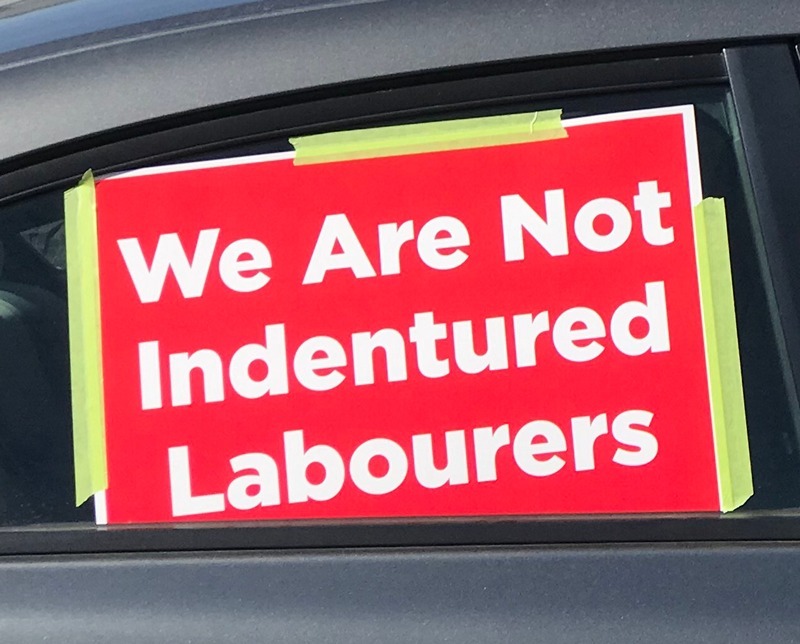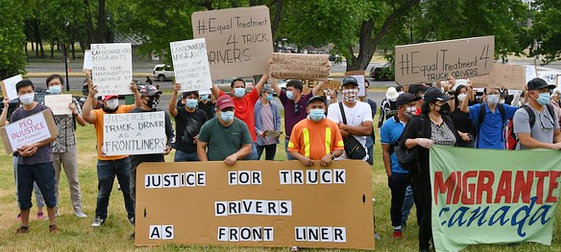Supply Chain Problems
Pay First-Rate Attention to Working Conditions of Transportation Workers!
– Normand Chouinard –
Today there is a lot of talk about problems with supply chains, the dearth of truckers because of the pandemic, blaming truckers for spreading COVID-19 and the like. A narrative of false causes and consequences presents the problems in the supply chains as the cause of price inflation and, before you know it, truckers are the cause of price inflation.
The public hears very little, if anything at all, about the working conditions of truckers in Canada and the United States, which are treated as one entity called North America because of Canada’s integration into the U.S. economy. It is mainly truckers who guarantee the supply chain when it comes to food and non-food products. Without them, there is no supply chain. It is as simple as that. The human factor is key and the reason it is important to recognize the role truckers play.
There is a huge gap between truckers being praised as essential by heads of government and ministers in words, and that fact being recognized in deeds. There is a big difference.
 Since the beginning of the coronavirus pandemic in 2020, more and more people have become aware of supply chain issues. It is no secret that the globalization of the last decades has led to a production chain of manufactured goods across the planet. This requires an extensive transport network to guarantee “just in time” delivery of the produced goods to their destinations. Every day, tens of millions of workers in the maritime, air, rail and road transport sectors move goods produced by the industrial working class all over the globe.
Since the beginning of the coronavirus pandemic in 2020, more and more people have become aware of supply chain issues. It is no secret that the globalization of the last decades has led to a production chain of manufactured goods across the planet. This requires an extensive transport network to guarantee “just in time” delivery of the produced goods to their destinations. Every day, tens of millions of workers in the maritime, air, rail and road transport sectors move goods produced by the industrial working class all over the globe.
Truckers are key in the supply chain. There are more than 4 million truckers in North America, driving vehicles that range from large tractor trailers to small delivery trucks. Eighty per cent of all goods in circulation in the United States and Canada are moved by these truckers. The problems facing truckers are many, and what stands out most in this pandemic is the complete inaction of the various levels of government and industry leaders to guarantee the rights and conditions of this immense work force.

Independent truckers line the streets close the White House in Washington, DC, May 11, 2020, protesting low rates they receive and suffocating costs they have to pay.
At the start of the pandemic, heads of governments and ministers repeatedly praised truckers, repeating over and over how indispensable and essential they were. One would have thought that the conditions for truckers would have improved since that time, but that is not the case. Some demands have been met, such as satisfying the need for new truck stops with toilets, especially in the United States, after restaurants closed because of COVID-19. There has been some increase in rates of pay and wages but they do not take into account the dizzying increase in transport prices. The increase paid to truckers is extremely low and not proportionate to the increase in prices. In short, the money is going elsewhere and truckers know whose pockets are being lined.
 The question remains: How are we going to guarantee that truckers can carry out their work with dignity and in humane conditions? The problems are various. For example, in the intermodal industry — container shipping — thousands and thousands of workers are subject to the worst working conditions, and a large portion of them are temporary foreign workers, whose rights the owners and governments do not recognize. Their working conditions are a new form of enslavement.
The question remains: How are we going to guarantee that truckers can carry out their work with dignity and in humane conditions? The problems are various. For example, in the intermodal industry — container shipping — thousands and thousands of workers are subject to the worst working conditions, and a large portion of them are temporary foreign workers, whose rights the owners and governments do not recognize. Their working conditions are a new form of enslavement.
There are long-distance drivers who are on the road more than 250 days a year — away from home and their families. There are local truckers in the big cities whose salaries are far too low, and who face serious problems as a result of unstable and irregular working hours.
The latest news is that Canada’s Prime Minister has issued an executive order that will force truckers from the United States to be vaccinated in order to enter Canada and returning Canadian truckers who are not vaccinated to undergo pre-entry, arrival and Day 8 testing as well as to quarantine after finishing their deliveries. This is the only measure that has been taken by governments with regard to truckers. It has given rise to a huge backlash from the industry which says that the supply chain will be seriously affected and price inflation will become worse. Already there are many truckers off the roads because they have COVID-19 and it is not known how many more will quit because they refuse to submit to government dictate. The bottom line of the Prime Minister’s vaccine mandate: blame the truckers for empty shelves and price inflation.
It is unacceptable. The real bottom line is that neither the Prime Minister’s government nor that of the United States are doing anything to end the pay-the-rich direction of government decisions which exacerbate exponentially the problems facing the natural and social environment.
What is needed is a guarantee of dignified working conditions for all truckers and a sovereign system of food production that guarantees food security. As well, trade should be conducted for mutual benefit on a rational basis, so that trucks and ships and planes are not needlessly plying the roads, oceans and skies of the world leaving pollution in their wake. If dignified living standards and working conditions of members of society were upheld, then food production and manufacturing would take place first at home.
As 2022 gets underway, Canadians and Quebeckers will be forced to shoulder the problems of the supply chains. The most important thing to consider is the necessity to provide Canada’s economy with a new direction. The issues of truckers’ rights, recognition of their trade, and how a society can be supplied with what it needs in an environmentally safe and secure manner are central in approaching the issue of the constantly failing supply chains.
And remember: Don’t blame the truckers!
Workers’ Forum, posted January 18, 2022


